Quarterly Newsletter - April 2024 - Issue No. 22
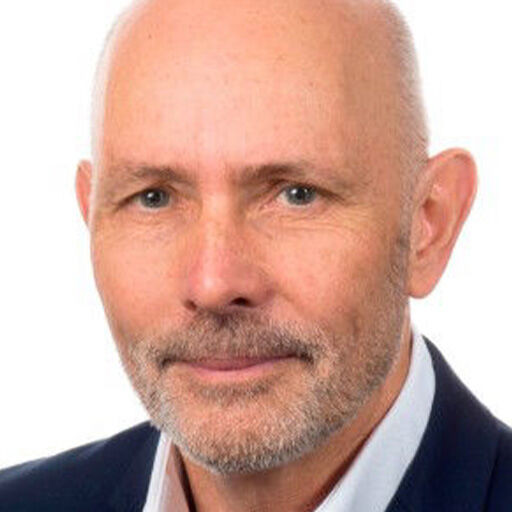
Director’s Foreword
Welcome to the January 2024 issue of the Global Psoriasis Atlas (GPA) newsletter. This SKINSCAPE (Skin Disease in the Eastern Cape) Special Edition newsletter will provide a “hot off the press” overview of the cross-sectional field survey we recently conducted in two villages in South Africa’s Eastern Cape: Mtyholo Dlova and Mdolomba. It acknowledges the significant contributions of industry volunteers Louise Topping and Elsa Taicher from Janssen and L’Oréal respectively, volunteer dermatologists from the UK, Israel and South Africa and local community workers who were with us during the survey. SKINSCAPE couldn’t have happened without collaboration, support and sustainability from local dermatologists, healthcare workers and researchers led by Professor Ncoza Dlova (Durban). We were also joined by the Director of the Global Atopic Dermatitis Atlas (GADA)– Professor Carsten Flohr (London) in what we hope will be the first of many joint ventures between the two programmes. The work represents a significant advance in our understanding of the epidemiology of skin disease in this rural part of South Africa and helps define the blueprint for future field surveys of skin disease. What I find particularly gratifying is that the GPA and GADA are not only allowing us to gather data on psoriasis and atopic dermatitis but also act as the canvas for acquiring data on skin diseases in general. We will be presenting data from SKINSCAPE at various international medical conferences this year and are already starting to write the research papers emanating from the work.
I will close by announcing some sad news for the GPA that our Programme Manager – Rebekah Swan – who has been in post since the very start of the atlas is leaving us for pastures new at the end of January. On behalf of all of us in the GPA community, I would like to give a big thank you to Rebekah for her sterling contributions to all aspects of our global endeavour and wish her all the best for the future. I also extend warm wishes to everyone for a prosperous and joyous 2024, filled with new opportunities and achievements, and hope to see you in person at various events around the world.
With my best wishes,
Chris Griffiths
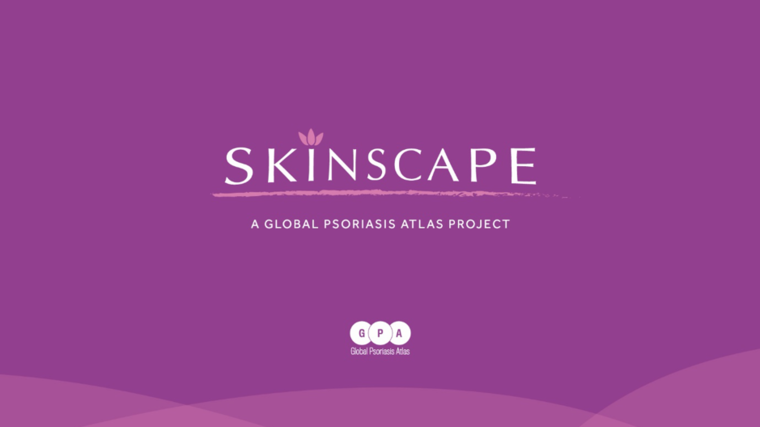
Background to SKINSCAPE
In December 2018 the GPA team was awarded a Global Challenges Research Fund grant to perform a survey of skin diseases with a focus on psoriasis at the Regional Dermatology Training Centre (RDTC) at the Kilimanjaro Christian Medical Centre, Moshi, Tanzania. In July 2019, working closely with the RDTC Director, Dr Daudi Mavura and dermatologists from across Sub-Saharan Africa the GPA researchers, (including Professor Ncoza Dlova, Durban) conducted a field survey on the prevalence of skin diseases in the Maasai people of Northeast Tanzania; the findings of this work have now been published in the British Journal of Dermatology. We also worked closely with colleagues at the RDTC to co-design a comprehensive field survey suitable for use in African countries.
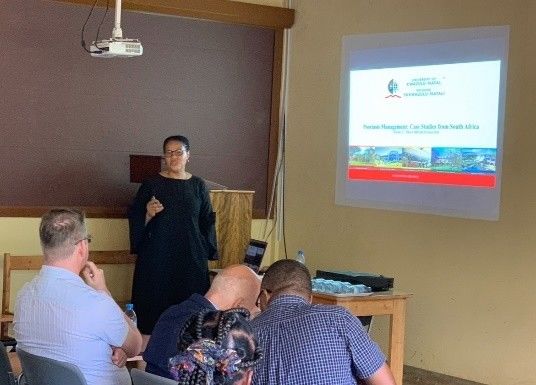
Professor Dlova Presenting on “Psoriasis Management in South Africa” at the RDTC
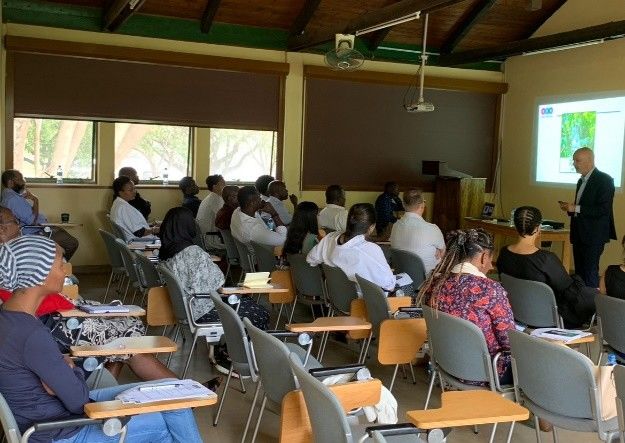
Professor Griffiths Presenting the information about the GPA at the RDTC
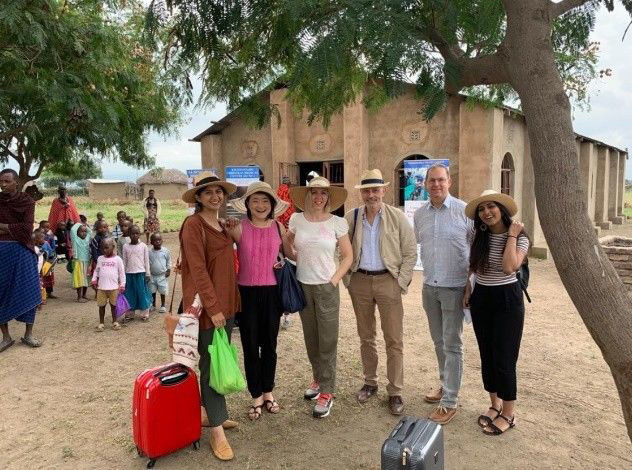
Outside the Church (Left to right) Dr Sidra Khan, Dr Tina Tian, Rebekah Swan, Professor Chris Griffiths, Professor Darren Ashcroft, Nirohshah Trialonis-Suthakharan
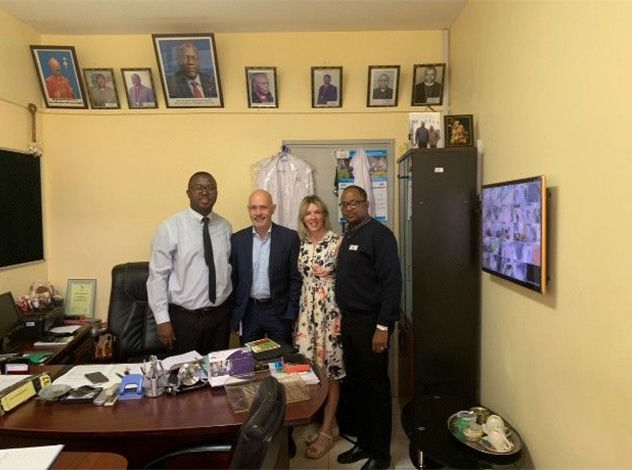
At Kilimanjaro Christian Medical Centre (Left to right) Professor Gileard Masenga, Professor Chris Griffiths, Rebekah Swan, Dr Daudi Mavura
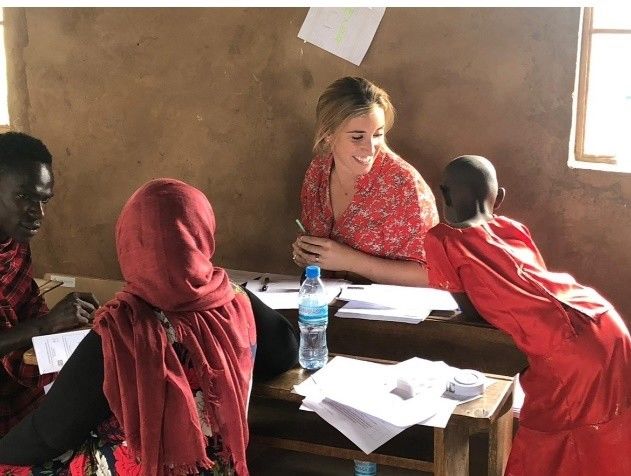
Kathryn Hampton from Janssen, with Maasai children
This groundwork, led by Professors Ashcroft and Griffiths with our colleagues at the RDTC in Moshi, Tanzania, laid the foundation for our most recent study SKINSCAPE (Skin Disease in the Eastern Cape) conducted in the Eastern Cape, South Africa. In an exciting progression, the GPA team completed the first-ever cross-sectional epidemiological study of skin disease in this part of Africa. This represents a pivotal step forward in our commitment to advancing the understanding of the epidemiology of skin diseases worldwide.
"This survey was an opportunity to shed light on the prevalence of skin diseases in our community. The collaboration with international experts facilitated the integration of research with education and community development. Most research is conducted in urban and suburban locations, and I thought it would be opportune and interesting to do the same in rural settings." Professor Ncoza Dlova
SKINSCAPE Aims and Objectives
SKINSCAPE represents a milestone achievement in our GPA research and was driven by Professors Chris Griffiths and Darren Ashcroft in partnership with Professor Carsten Flohr, (Director, Global Atopic Dermatitis Atlas (GADA) King’s College London), and in collaboration with Professor Ncoza Dlova, Head of the Dermatology Department at the University of KwaZulu-Natal (UKZN), Durban, South Africa, and a Regional Coordinator for the GPA. Professor Ncoza Dlova and her team were instrumental in steering this research initiative for her community. The interdisciplinary team comprised dermatologists from the UK, Israel, and South Africa, who worked closely with researchers, and volunteers from industry.
The Dermatologists
- Professor Chris Griffiths, UK
- Professor Carsten Flohr, UK
- Dr Su Lwin, UK
- Dr Jingyuan Xu, UK
- Dr Shir Azrielant, Israel
- Professor Ncoza Dlova, South Africa
- Dr Jacob Sons, South Africa
- Dr Sarina Drusinsky, South Africa
- Dr Suretha Kannenberg, South Africa
- Dr Chioma Ede, South Africa
- Dr Antoinette Chateau, South Africa
- Dr Andiswa Skhenjane, South Africa
- Dr Zikhona Gxolo, South Africa
- Dr Sthembiso Mhlanga, South Africa
- Dr Zama Ndlovu, South Africa
- Dr Avumile Mankahla, South Africa
Professor Carsten Flohr said: "Joining the GPA team for the SKINSCAPE fieldwork in the Eastern Cape, representing the Global Atopic Dermatitis Atlas, was a great experience. Thanks to Rebekah Swan and the rest of the GPA team’s excellent preparation, the survey went very smoothly. It was also a great insight into life in this rural part of South Africa. The best of all, however, was the dancing and warm welcome we received from the communities. I look forward to further joint field trips with the GPA."
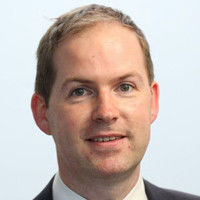
Professor Darren Ashcroft
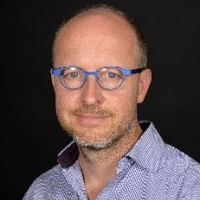
Professor Carsten Flohr
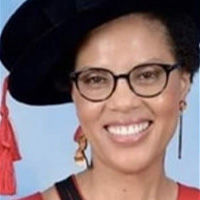
Professor Ncoza Dlova
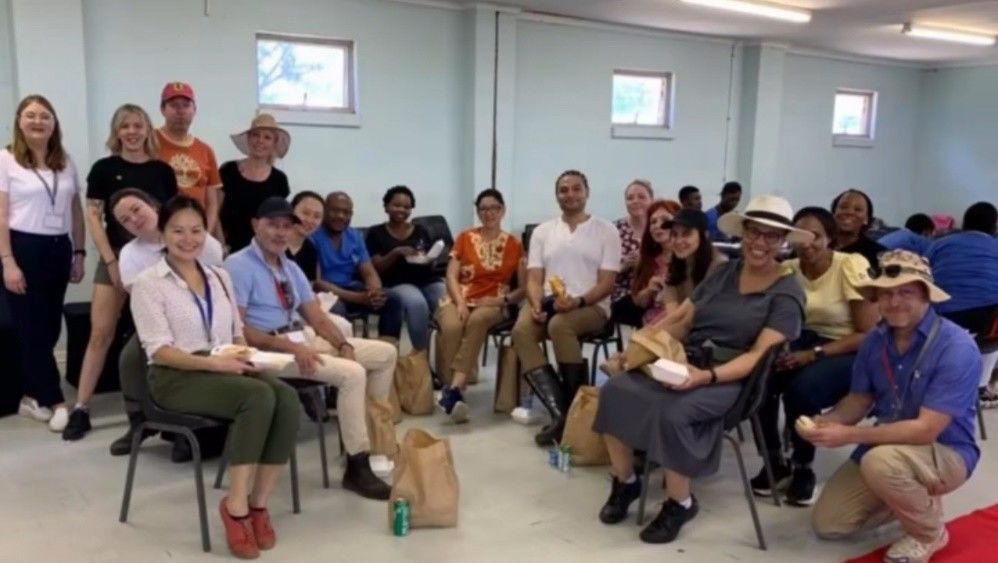
Members of the SKINSCAPE Team at Mtyholo Community Hall
This was an ambitious project designed to demonstrate that by working together we will be able to improve research capacity and access to sustainable health and well-being, for people with psoriasis, atopic dermatitis, and other skin diseases in Sub-Saharan Africa (SSA). Skin disease in developing countries can be associated with disfigurement, stigmatisation and increased socioeconomic burden. The World Health Organization (WHO) has recognised this impact; however, there are still limited data on the prevalence of skin diseases. In addition, we have a limited understanding of the impact on affected individuals' quality of life and any barriers there may be to accessing care.
SKINSCAPE Study Design and Methodology
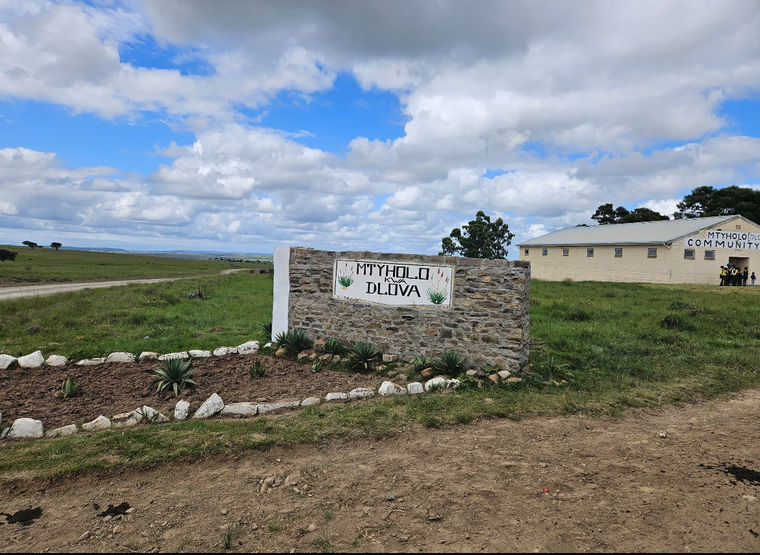
The wall at the entrance to Mtyholo built by the local community to commemorate our visit
After receiving ethical approval from the UoM, UKZN and local permissions in the Eastern Cape to carry out a cross-sectional study in two villages, Mtyholo Dlova and Mdolomba, house-to-house visits were conducted, guided by local community workers who also acted as interpreters as the predominant language spoken was Xhosa.
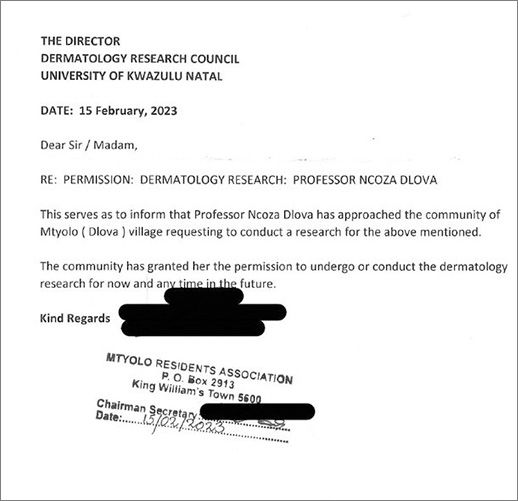
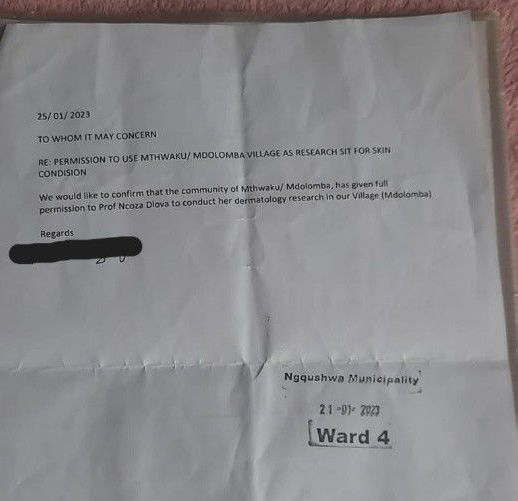
Local Permission Letters, Mtyholo Dlova and Mdolomba
The SKINSCAPE team faced varying weather conditions during their fieldwork, experiencing days with temperatures soaring to 31 degrees Celsius and abundant sunshine, while others brought cooler temperatures of 17 degrees accompanied by wind and rain. For safety precautions due to the presence of snakes during house-to-house visits, the team wore gum boots.
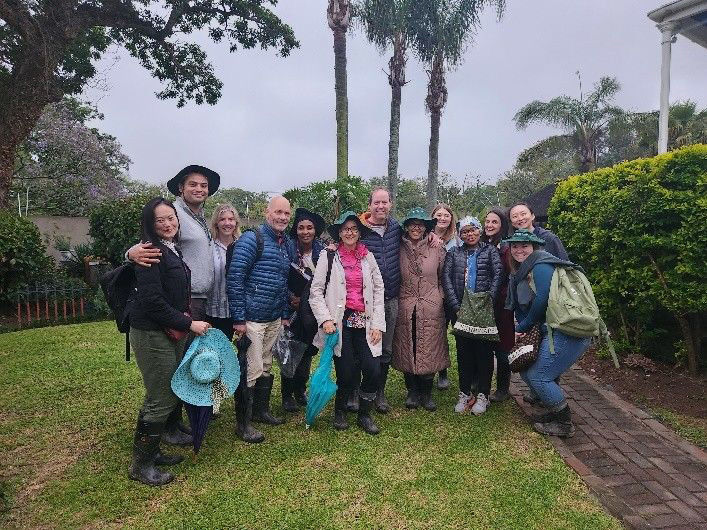
Image left to right – Dr Su Lwin, Dr Jacob Sons, Rebekah Swan, Professor Griffiths, Dr Chioma Ede, Dr Antoinette Chateau, Professor Darren Ashcroft, Professor Ncoza Dlova, Alison Wright, Dr Andiswa Skenjhane, Dr Shir Azrielant, Dr Jingyuan Xu, Louise Topping.
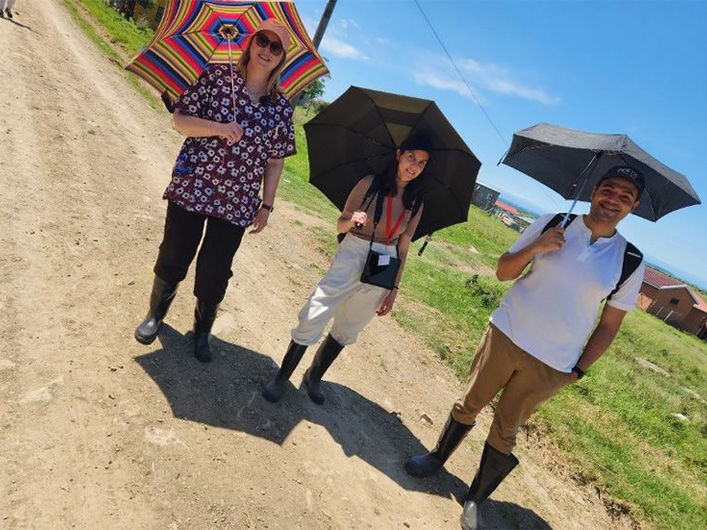
Image left to right – Dr Suretha Kannenberg, Dr Shir Azrielant, Dr Jacob Sons
The SKINSCAPE research teams utilised REDCap, a secure web application for data collection and management, loaded onto iPad tablets to streamline and enhance the process of gathering and organising comprehensive data on skin diseases. A total of 715 participants were recruited for the study, 218 in Mtyholo Dlova and 497 in Mdolomba. The team employed a baseline household data collection form to enquire about participants' socioeconomic circumstances and to identify individuals with skin disease. Participants identified with psoriasis or atopic dermatitis underwent comprehensive reviews and examinations at the village's community hall. Additionally, any complex cases of skin disease were carefully assessed by the dermatology team, with necessary referrals made for treatment at local hospitals.
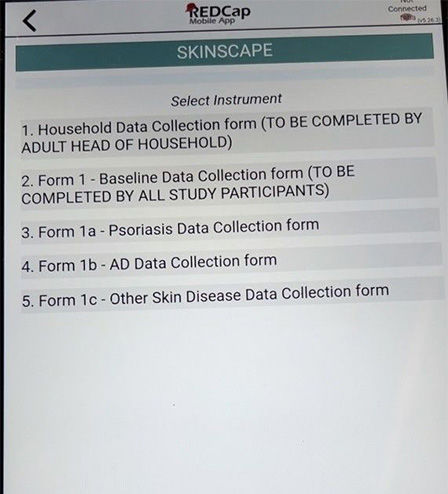
SKINSCAPE REDCap Data Collection Instruments
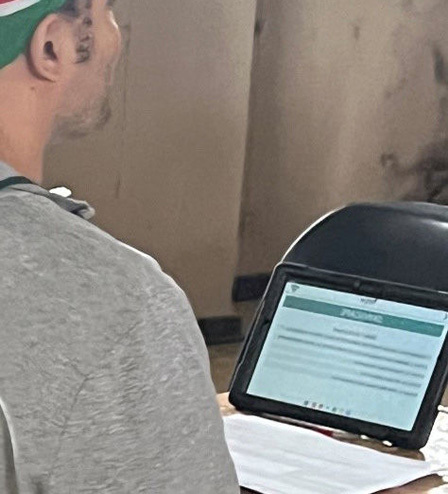
Dr Jacob Sons completing the REDCap Questionnaires
Milestone Achievement
SKINSCAPE will result in the first-ever estimates of the prevalence of skin diseases in the region, providing an overview of psoriasis and atopic dermatitis to contribute to the epidemiological work of the GPA and GADA. Dr Alison Wright, GPA Fellow, is currently analysing the data and the team look forward to publishing the results of this important work, as they refine the survey methodology for future studies elsewhere in the world, setting the stage for providing evidence for better access to care for people with skin disease wherever they may live.
The team (including dermatologists, trainees, research, and management staff) is committed to creating a lasting impact and fostering a legacy of knowledge and support for the communities involved. The collaborative nature of SKINSCAPE fostered a rich exchange of knowledge and insights, particularly with the South African team. The international collaboration has provided a unique opportunity for cross-cultural learning, and the South African team, with their expertise in the presentation and diagnosis of skin diseases on black skin, made invaluable contributions to the broader understanding of dermatological conditions in different populations.
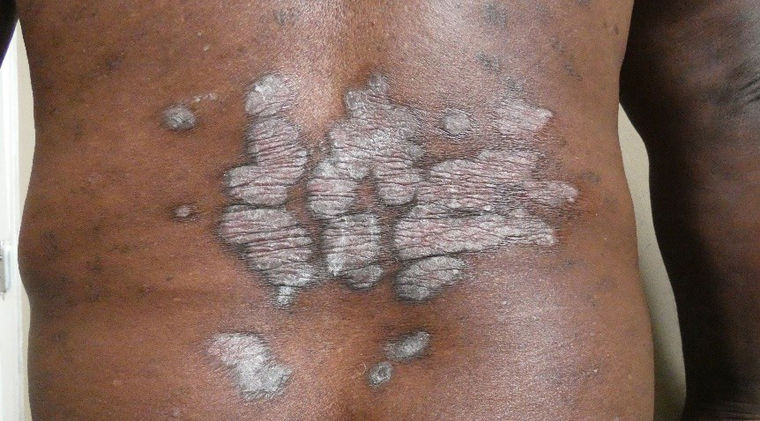
Clinical insight: psoriasis case presentation in a SKINSCAPE participant
Industry Involvement in SKINSCAPE
This project garnered support from various industry partners worldwide, highlighting the importance of such collaborations in advancing dermatological research in underserved regions.
Elsa Taicher (Global Professional Relations Manager, L'Oréal) facilitated the delivery of emollients and sunscreen for distribution by the SKINSCAPE team working in the two community halls and to the local hospital. Dr Zikhona Gxolo, an East London-based dermatologist, attached to the Cecilia Makiwane Hospital who has worked with Ncoza Dlova, handled the logistics of facilitating the visits and research in the two villages, said:
"I am thrilled that they are here. It will shine a light on the Eastern Cape. We have a shortage of dermatologists in the province. Bringing people from the deep rural areas to hospitals for analysis and treatment can result in a three to six-month waiting period, and the symptoms don’t go away while they wait.” Following the study visit, she went on to say, ‘’Professor Dlova a blessing to the community and the region, for ensuring that so many of the emollients were donated to the local dermatology clinics for use there."
The impact of SKINSCAPE has been far-reaching for dermatologists and volunteers, providing important experience and insights into the challenges faced by health systems and people with skin disease in underserved populations.
Volunteer Testimonials
"In December 2023 I travelled to South Africa with the Global Psoriasis Atlas to volunteer in their SKINSCAPE study, utilising the volunteer days that Janssen provides. This was an incredible experience that I struggle to put into words. It was educational, humbling, emotional, gratifying, and motivational all at once. It was an honour to be with an esteemed group of dermatologists, from both the UK and South Africa, and to witness their interactions with participants, soak up their knowledge, and learn more about dermatology in skin of colour. To be with the dermatologists completing the PASI/EASI scores for the psoriasis and AD patients, and to be with the patients competing DLQI (quality of life questionnaire) was a particular professional highlight for me. This showcased first-hand how much inflammatory skin disease can impact a patient's quality of life, even when the skin disease isn’t considered ‘severe’, an issue that remains a large unmet need even in the UK. I am also so grateful to J&J for providing us with volunteering leave to give us the opportunity to give back."
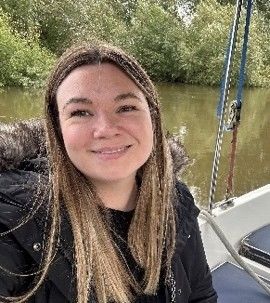
Louise Topping, Scientific Advisor, Janssen
"For the past 10 years, I have been involved in projects such as the International Awards for Social Responsibility in Dermatology. These rewarding initiatives are led by dermatologists, creating a positive impact on the lives of patients with severe skin diseases. I was always impressed by my community and dermatologists giving their time to serve patients in need. As a result, I became passionate about humanitarian dermatology as I believe that we can do better for access to skin health in the future. When Chris Griffiths, Director of the Global Psoriasis Atlas and Rebekah Swan, GPA Programme Manager, shared the plans for the GPA SKINSCAPE survey with me, I saw it as a life-changing opportunity to join and serve these populations in underserved areas and support this group of inspiring dermatologists. At the beginning of December 2024, I took a week out of work, left my two children, and travelled to East London in South Africa to join the group. I asked my company to donate emollients which they generously provided and shipped from our factory in France to South Africa. Participating in this research field study has made me realise how important these emollients are to support patients and improve their quality of life with skin diseases. More importantly, I also learned that these patients and the local hospitals often have no access to these products. I now realise how fortunate we are to have access to these things where we live. A big thank you to the GPA team, I want to continue to volunteer for such amazing projects in the future."

Elsa Taicher, Medical Relations Director -
L’Oréal Dermatological Division
Unilever generously donated large bags of skin care products and toiletries for every family of Mtyholo Dlova and Mdolomba villages and the team and community workers loaded the boxes on and off the bus and into the community halls for distribution to the village members.

Unilever Products in Storage at Dr Drusinsky ‘s Medical Practice
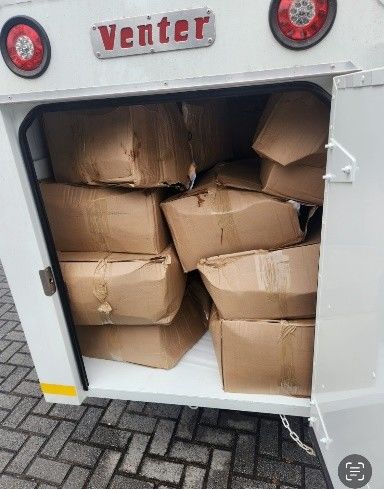
Trailer Loaded with Unilever Products
International Collaboration
The collaborative nature of SKINSCAPE has proven to be instrumental in fostering a rich exchange of knowledge and insights, particularly with the South African team. The international collaboration has provided a unique opportunity for cross-cultural learning, and the South African team, with their expertise in the presentation and diagnosis of skin diseases in individuals with black skin, has made invaluable contributions to the broader understanding of dermatological conditions. The exchange of experiences and perspectives has not only enhanced the depth of the research but has also facilitated a more inclusive approach to dermatological studies, ensuring that the nuances of skin diseases in diverse populations are adequately considered. This collaborative synergy underscores the significance of global partnerships in advancing dermatological research, access to resources and ultimately contributing to more accurate diagnoses and tailored treatment approaches for individuals with various skin types.
Top 10 Skin Conditions: Insights from the SKINSCAPE Study
- Acne vulgaris (L70.0)
- Xerosis cutis (L85.3)
- Tinea capitis (B35.0)
- Chloasma/Melasma (L81.1)
- Seborrhoeic keratosis (L82) – this includes skin tags, dermal papulose nigra
- Pityriasis alba (L30.5)
- Seborrhoeic dermatitis (L21)
- Postinflammatory hyperpigmentation (L81.0)
- Alopecia (nonscarring) (L65) – this includes traction alopecia
- Alopecia (scarring) (L66) – this includes frontal fibrosing alopecia
In Durban, Professor Griffiths and members of the international dermatology team were able to visit UKZN for a tour of the medical school and department of dermatology with Professor Dlova.
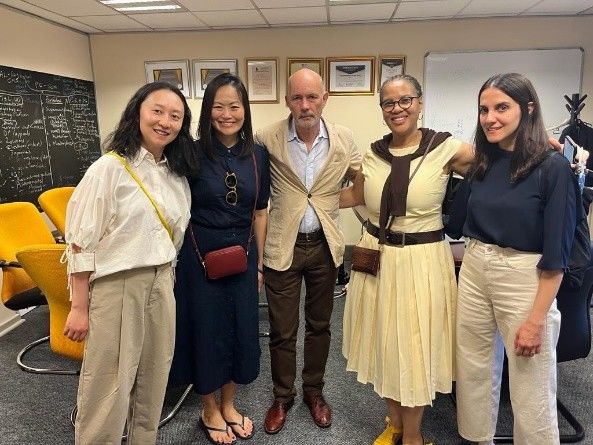
Left to right - Dr Jingyuan Xu, Dr Su Lwin, Professor Chris Griffiths, Professor Ncoza Dlova, Dr Shir Azrielant
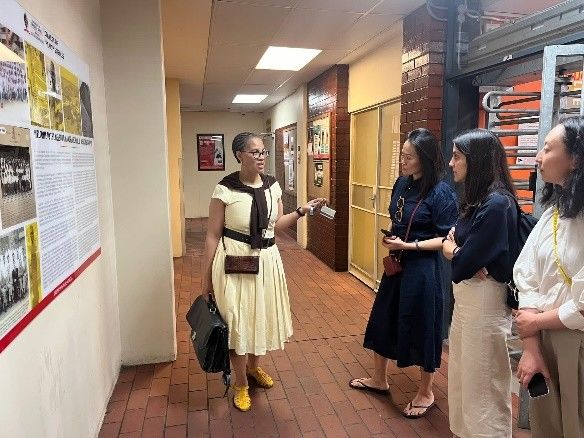
Left to right - Professor Dlova, Dr Su Lwin, Dr Shir Azrielant, Dr Jingyuan Xu
Community Impact
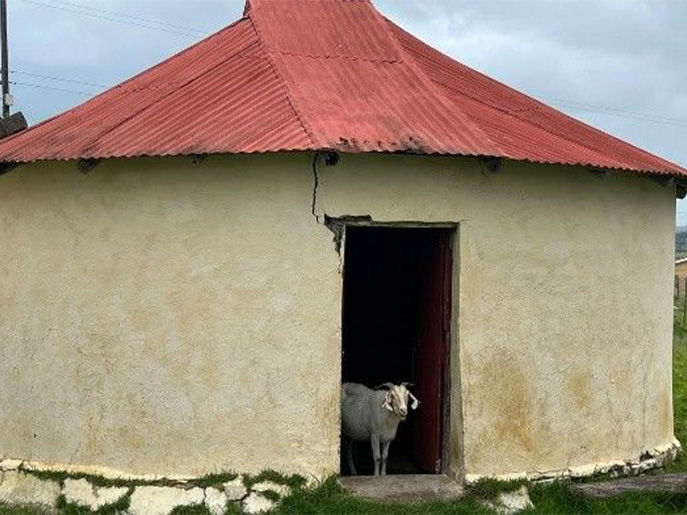
Mdolomba
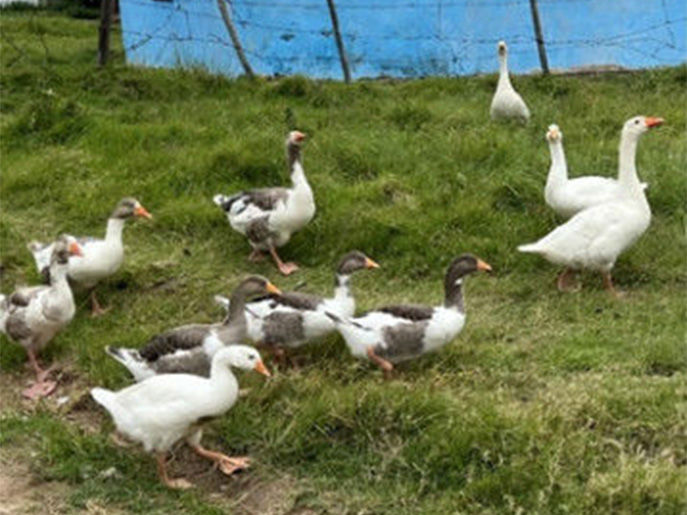
Mtyholo Dlova
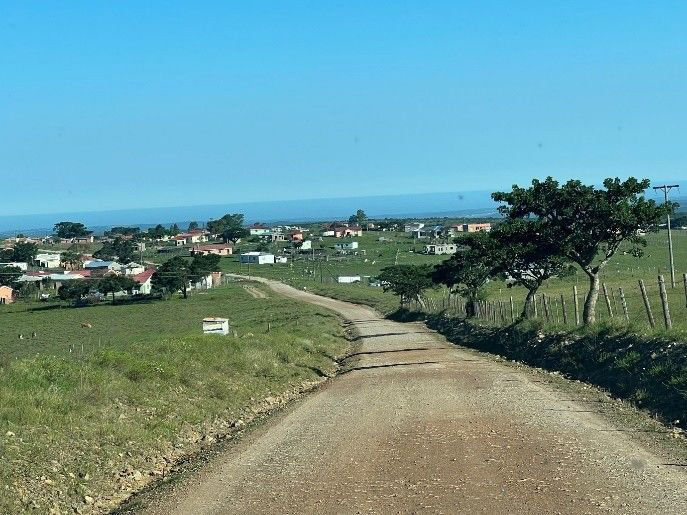
The Road to Mdolomba
Professor Dlova said: "It was a pleasure for us to be able to reach out and plough back into the communities that we were raised in. My colleagues were very supportive, some even sacrificed their annual leave and income just to be part of this unprecedented initiative. This is the first time something like this has ever been implemented in dermatology in South Africa. We all believe in the notion of ”ask not what the government can do for you, but what can one do to make a difference”. The community was blown away by the generosity of time from all the volunteers and being able to access a dermatologist’s opinion for the first time as this could not have been possible for them with their meagre salaries. The gifts that they also received through donations from Unilever South Africa and L’Oréal were pleasant Christmas gifts for most of them. The presence of academics and scientists also inspired many of the youth to pursue careers in medicine and they were quite thrilled to be wearing theatre blues and looking like doctors! Most of the youth could easily diagnose eczema, acne, and skin infections in no time!"
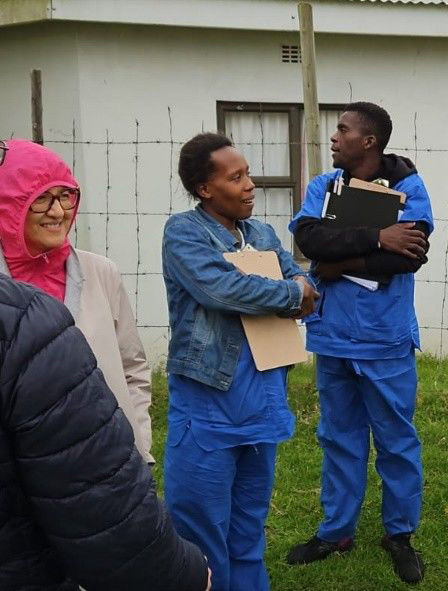
Two Local Community Workers Ready for House-to-House Visits with Dr Antoinette Chateau
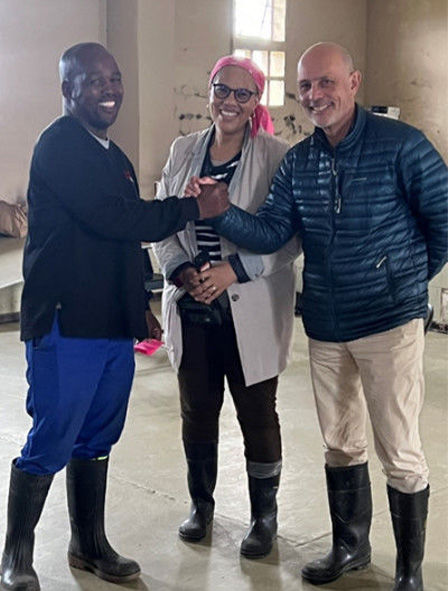
Mdolomba Community Leader, Professor Ncoza Dlova, Professor Chris Griffiths
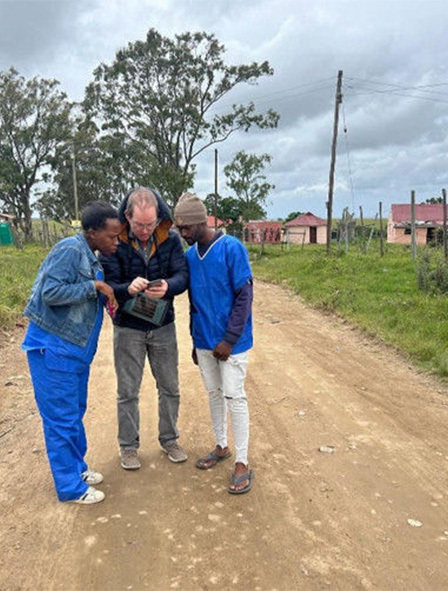
Professor Darren Ashcroft and Community Workers Examining Mtyholo Village Map
Conclusion and Next Steps
As we conclude this SKINSCAPE Newsletter, we celebrate the extraordinary accomplishments of generating first-ever estimates of skin disease prevalence in the region. The invaluable insights gained from this groundbreaking study not only enhance our understanding of dermatological conditions but also lay the foundation for future GPA research endeavours during Phase III of the Programme. Stay tuned for forthcoming publications and continued advancements as we continue to collaborate with dermatology teams around the world to contribute to the global epidemiological data on psoriasis. Your ongoing support is instrumental in shaping the future epidemiological psoriasis research.
"This was the most ambitious and successful field survey undertaken by the Global Psoriasis Atlas to date. It could not have happened without the coordination and enthusiastic support of Professor Dlova and her team on the ground. But most of all I am immensely proud of the Manchester team and our volunteer dermatologists and industry personnel who worked tirelessly but with good humour under difficult conditions in the Eastern Cape." Chris Griffiths, GPA Director
